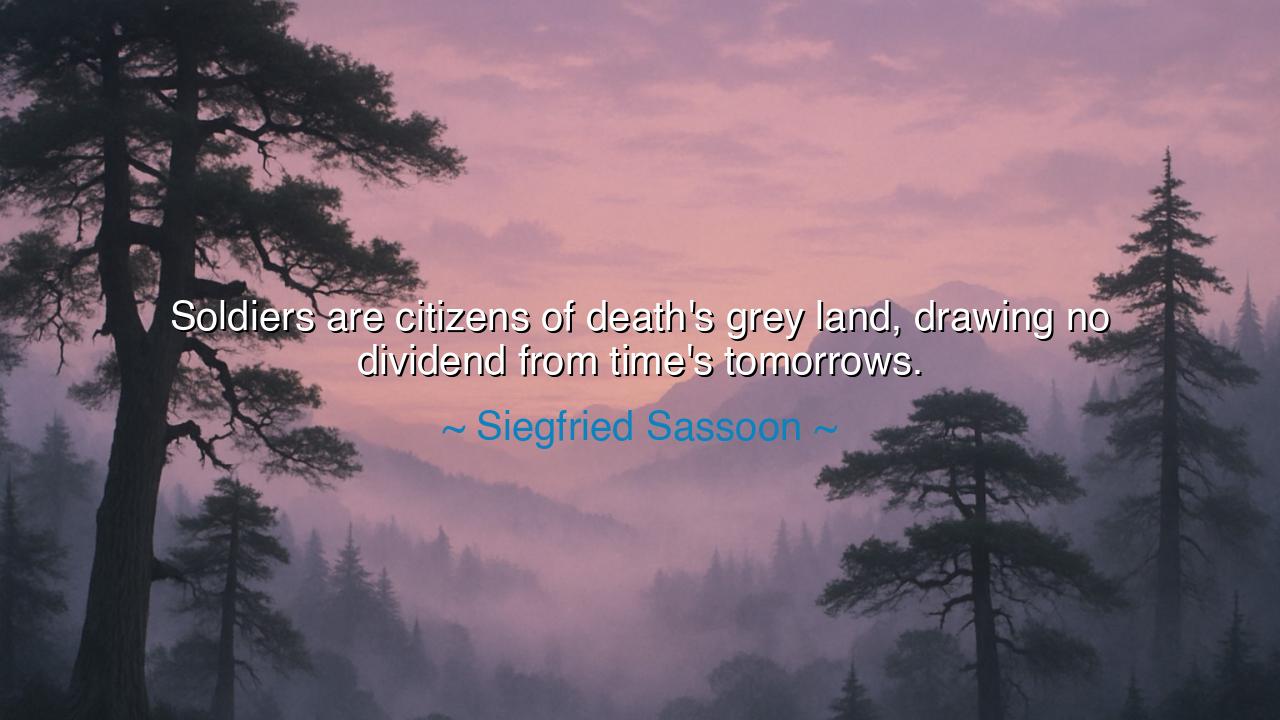
Soldiers are citizens of death's grey land, drawing no dividend






In the somber and immortal words of Siegfried Sassoon, soldier-poet of the Great War, there echoes both sorrow and revelation: “Soldiers are citizens of death’s grey land, drawing no dividend from time’s tomorrows.” These words, carved from the heart of a man who saw the trenches of Europe consumed by fire and mud, are more than poetry — they are a lament for the youth of nations, the sons and brothers who marched into the smoke of history and found only silence. Sassoon’s lines speak of the soldier’s exile — not only from home, but from the very promise of life and future. In the grey land of death, where time itself seems to halt, the soldier ceases to be a dreamer and becomes a shadow — one who fights, not for glory, but for survival.
The origin of this quote lies within Sassoon’s poem Dreamers, written during the First World War, that vast and senseless catastrophe which turned the green fields of Europe into seas of blood. Sassoon, who served with courage and disillusionment alike, wrote not as a distant observer but as one who had lived among the dying. He had watched friends fall beside him; he had seen the young grow old in a single night. From that crucible of horror came this truth: that soldiers, for all their valor, live on the threshold between life and death, denied the luxury of hope. They are “citizens” of that grim land, for once they step into war, the world of peace — with its laughter, its love, its promise of tomorrow — fades into unreality.
This idea of the “grey land” carries deep symbolic meaning. In ancient lore, grey is the color of twilight, the space between day and night — between being and not-being. It is the hue of uncertainty, of suspended life. The soldier, standing beneath the pall of battle, dwells in that half-world. He belongs neither to the living nor the dead; his heart beats, yet he lives as one already claimed by fate. The phrase “drawing no dividend from time’s tomorrows” deepens this tragedy: it means that for the soldier, the future has no interest, no return. Each sunrise may be his last; each heartbeat, a borrowed moment. The ordinary man plans for years ahead, but the soldier measures his life in hours.
Consider the story of Wilfred Owen, Sassoon’s comrade and fellow poet of the trenches. Owen wrote of “the pity of war” — how the nobility of sacrifice had been betrayed by the cruelty of mechanized slaughter. He perished just one week before the armistice, at the age of twenty-five, his mother receiving the telegram of his death as the church bells rang to announce peace. In him, as in so many others, we see Sassoon’s words made flesh: a man who gave his youth, his art, and his tomorrows to a cause that devoured them all. Such is the cruel arithmetic of war — that it demands the living to dwell among the dead, and calls it duty.
Yet Sassoon’s words do not scorn the soldier — they sanctify him. For though he calls the soldier a “citizen of death’s grey land,” he does so with reverence, not condemnation. The soldier’s tragedy lies not in cowardice, but in sacrifice — that he bears the burden of war while others enjoy the peace he defends. The soldier is bound by an oath not only to his nation, but to the comrades beside him, to the fallen who cannot rise. And though he draws “no dividend” from the morrow, his courage purchases the freedom of those who will. Thus, within the shadow of despair, Sassoon hides a spark of reverence — for in the soldier’s acceptance of mortality, there lies a form of immortal strength.
The ancients, too, knew of such men. When Leonidas and his three hundred Spartans stood against the Persian tide at Thermopylae, they knew they would not see another dawn. Yet they fought, not for victory, but for honor — that the world might remember there were once men who refused to yield. They, too, were citizens of death’s grey land, but their defiance turned that grey into gold. The lesson is eternal: that mortality, when faced with courage, becomes the seed of meaning. To live in awareness of death is not to despair, but to awaken — to know that every breath is precious, every act sacred.
So, my child of tomorrow, take this teaching to heart: though few will walk the battlefield, all must face the truth of time’s passing. Do not waste your life in fear or complacency. The soldier’s fate reminds us that the measure of a life is not its length, but its depth. To live as if tomorrow were promised is to live asleep; to live as if it were not is to live awake. Each day, therefore, take up your own quiet battles — against apathy, against injustice, against the death of the spirit — and fight them with the courage of one who knows that time is finite.
For as Siegfried Sassoon teaches, we are all, in some way, citizens of that grey land — bound by mortality, yet free to fill our fleeting days with purpose. The soldier’s tragedy becomes our reminder: that while death may claim the body, only despair can claim the soul. Let us, then, live so fiercely, so nobly, that when the final dawn comes, we may say as they did — we were not afraid.






AAdministratorAdministrator
Welcome, honored guests. Please leave a comment, we will respond soon